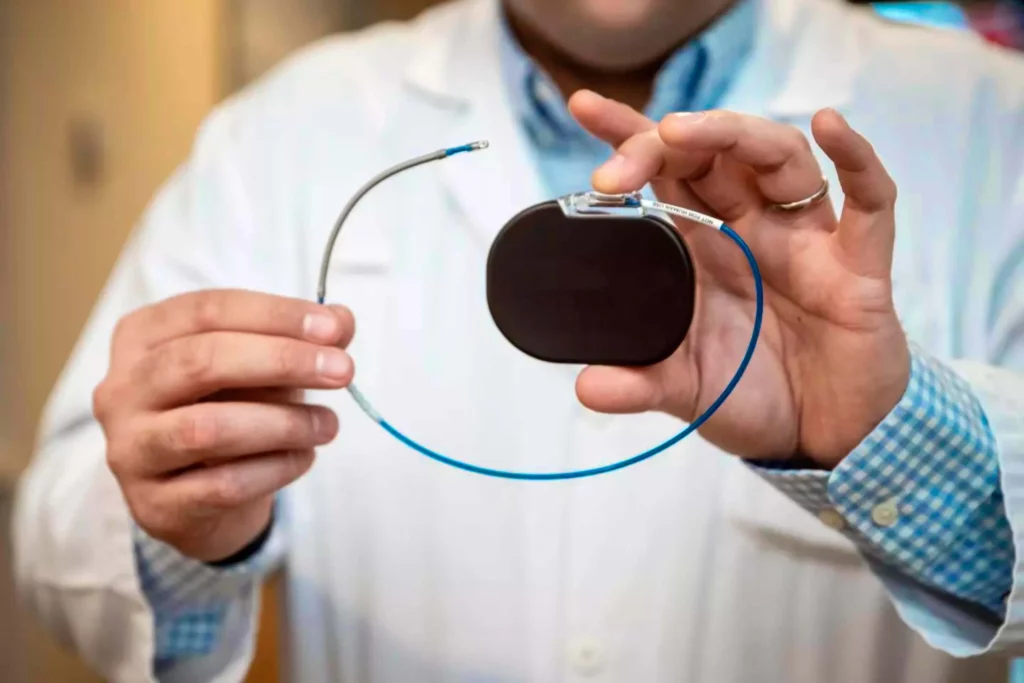Sinus bradycardia is a specific type of bradycardia that originates in the sinus node, also known as the sinoatrial or SA node. This node acts as the heart’s natural pacemaker, generating the electrical impulses that regulate the heart rate.
To better understand what sinus bradycardia is, it’s important to define bradycardia itself.
What Is Bradycardia?
Bradycardia is a condition in which the heart beats at a slower rate than normal. In a healthy adult at rest, a normal heart rate ranges between 60 and 100 beats per minute (bpm).
When the heart rate falls below 60 bpm, it is considered bradycardia. However, this isn’t always cause for concern. For instance, well-trained athletes commonly have resting heart rates below 60 bpm.
Still, it’s important to evaluate this condition, as in some cases it has no negative effects, while in others it’s crucial to identify the underlying cause to prevent future complications.
Bradycardia is one type of arrhythmia—a broader category that also includes tachycardia (a heart rate that is too fast) and atrial fibrillation (an irregular heart rhythm).
Is Sinus Bradycardia Dangerous?
In sinus bradycardia, even though the sinus node is functioning properly, the heart beats more slowly than normal. This is often benign in young and healthy individuals, but in others—particularly older adults or those with heart conditions—it may signal an underlying problem.
To determine whether sinus bradycardia is dangerous, it’s essential to consider the patient’s age, general health, the underlying cause, and symptoms.
Common bradycardia symptoms may include:
- Fatigue
- Lightheadedness or dizziness
- Shortness of breath
- Chest pain
- Confusion
- Memory issues
In some individuals, sinus bradycardia can compromise the delivery of oxygen-rich blood throughout the body, which is a serious concern.
If sinus bradycardia is caused by another medical condition, it’s essential to treat that underlying cause to prevent severe complications. Some potential causes include:
- Sick sinus syndrome: A common cause where the sinus node doesn’t function properly.
- Hypothyroidism: A condition where the thyroid gland doesn’t produce enough hormones, impacting heart rate regulation.
- Ischemic heart disease: Also known as coronary artery disease, this occurs when narrowed or blocked arteries reduce blood flow to the heart.
- Myocarditis: Inflammation of the heart muscle caused by infections (viral, bacterial, fungal, or parasitic) or autoimmune reactions.
- Myocardial infarction (heart attack): Although bradycardia doesn’t cause heart attacks, a heart attack affecting the area around the sinus node may result in bradycardia.
- Autoimmune diseases: Conditions like lupus or sarcoidosis may affect the sinus node.
- Electrolyte imbalances: Abnormal levels of electrolytes can impact the heart’s electrical system.
Bradycardia may also result from certain medications that list slow heart rate as a side effect.
Some potential risks linked to sinus bradycardia include hypoperfusion, which reduces cardiac output and limits the heart’s ability to supply sufficient blood to organs and tissues; fainting, a temporary loss of consciousness caused by a sudden decrease in blood flow to the brain, which—although not directly life-threatening—can pose danger due to falls or injuries; as well as heart failure, cardiac arrest, pacemaker-related complications, and other issues.
Sinus Bradycardia Treatment
Depending on the underlying cause, as well as the presence of symptoms, different treatments can be used for bradycardia.
Asymptomatic cases in otherwise healthy individuals may not require treatment but should be monitored regularly to prevent complications.
If caused by medications, a doctor may adjust the dose or recommend a different medication—patients should never make changes without consulting their healthcare provider.
A pacemaker may be recommended in more severe cases where symptoms are significant, especially in patients with sick sinus syndrome who do not respond to other treatments.
Addressing the underlying cause is also essential. Lifestyle changes such as reducing alcohol or tobacco use may be advised.
In most cases, sinus bradycardia does not pose a health risk, however, it’s still advisable to consult a doctor to ensure this is the case and, if necessary, determine the cause.
At the ABC Medical Center’s Arrhythmia Clinic, we can provide you with specialized care. Contact us!



